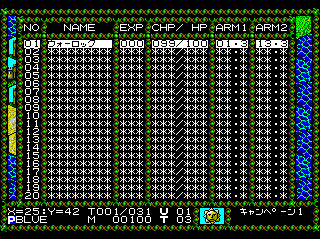


#MASTER OF MONSTERS MENU THEME FULL#
The ending theme “Black Demise” powerfully recapitulates the main theme and is full colour despite its brevity. This theme is like a more original and effectual version of A Beautiful Mind‘s “The Car Chase”. The darkest theme on the soundtrack, “Large Green Meadow”, builds with cinematic inclination upon a foreboding repeated motif though again simple, the effect is delicious due to Sakimoto’s meticulous programming. However, this is otherwise another odd fusion, the foreground of the track and soft development section being otherwise composed in a traditional classical manner. “Golden Warrior” is the most explicit manifestation of the funk undertones of the soundtrack also hinted in “We Will Conquer…” the slap bass guitar use and interlocking rhythms of the drums are particularly indicative of the style. Very fitting for a track inspired by the imagery of overcoming oppressive forces. Parts of the theme are inaccessible, particularly the oppressive bass line, but the track is excellently shaped and surprisingly emotional and catchy in places. Also experimental is “We Will Conquer the Crimson Valley”, which builds from a Jaws-inspired percussive riff and piles on aggressive dissonance. Originality is enhanced by a secondary section of avant-garde inclination. The canonic “Yellow Robe” is dominated by crisp Baroque harpsichord passagework Matsuo’s classical training shines here as his counterpoint, while straightforward, is sufficiently competent to stand out in an area that inspires so many pale imitators. While brief, Master of Monsters is a diverse work. The last mood-setter of the soundtrack, “Into the Deep Blue Sky”, has the most conventional and appreciable melody on the soundtrack and is gorgeously presented by Hitoshi Sakimoto’s crystalline synth. Effectively a duet, romantic imagery is detectable here. While the format of the track is very simple, the leading forces correspond in an endearing way, one undergoing motion while the other is playing a suspended note. “Standing in the White Fortress” features the interplay of two synth instruments against a thin bass line and some arpeggios. How one piece can simultaneously be frivolous yet exquisite, playful yet agonising baffles me. This work combines the classical rigorousness of Koichi Sugiyama with an emotional soul that is entirely Matsuo’s. It romantically heightens during several ascending chord progressions and glides into a sensitive secondary section. Moving onwards, the select mission screen’s “Purple Time” playfully meanders in triple metre with stunning lyricism and exhibits a dance-like quality. Fluid development through an introspective section into a full-scale march is also masterfully executed. Counterpoint from a secondary synth instrument reflects the nuances of the melody. However, the main melody has melancholic undertones and remains restrained from attaining bombast, in part due to Sakimoto’s synth programming. The memorable lead melody appropriately reflects the grandeur of the gamer’s quest to conquer nations using summoned creatures. The quasi-orchestral overture “Black Dignity” accompanies the game’s title screen. As the solo composer, Matsuo is nevertheless the star of the show. Matsuo, Sakimoto, and Sugiyama all make admirable contributions here, resulting in a diverse original score and arranged album that sounds excellent musically and technologically. In addition, it reflected a turning point in Matsuo’s relationship with his mentor Koichi Sugiyama, the famous Dragon Quest composer who directed this work. It also involved Hitoshi Sakimoto, who programmed and arranged orchestral music for the first time Matsuo and Sakimoto were to become close friends and colleagues, working together in works such as the Ogre series, Final Fantasy XII, Sword Maniac, and the Classic Road series. It was the first published composing work of Hayato Matsuo, now well-known for his contributions to many popular animes and tactical RPGs. The Genesis’ critically acclaimed strategy game Master of Monsters is historically significant.


 0 kommentar(er)
0 kommentar(er)
